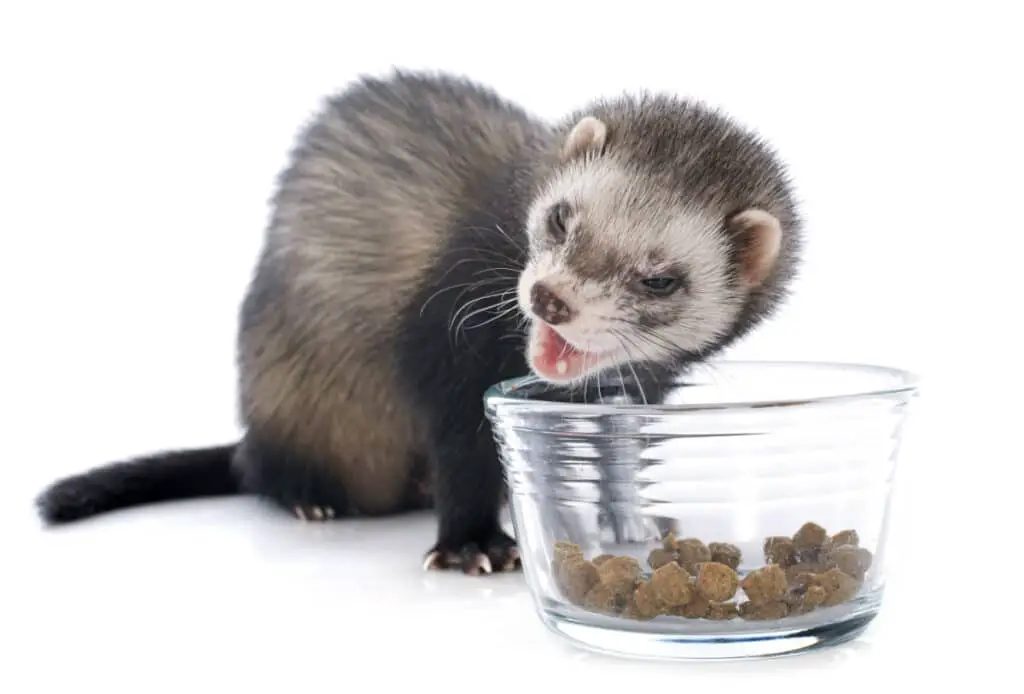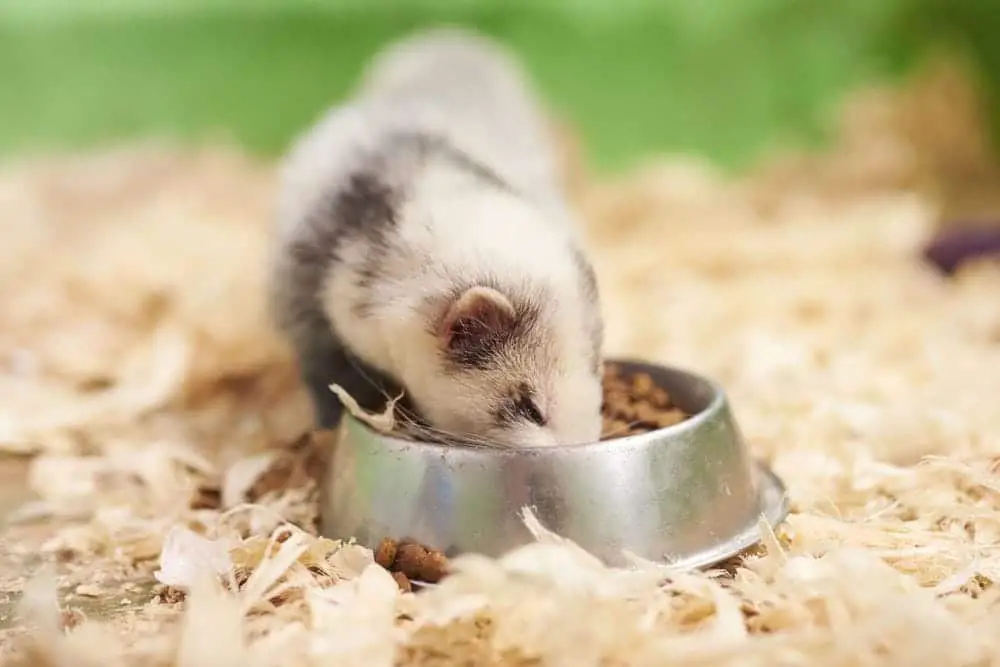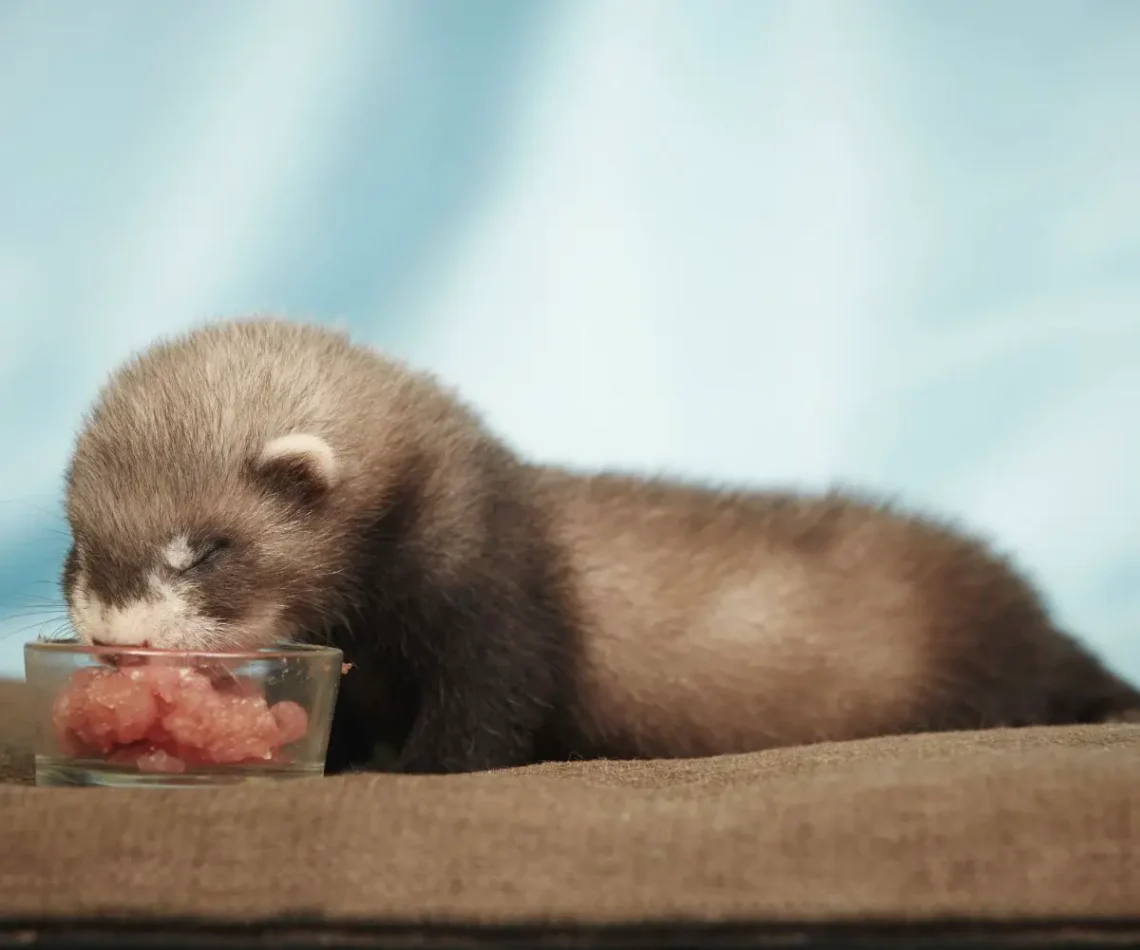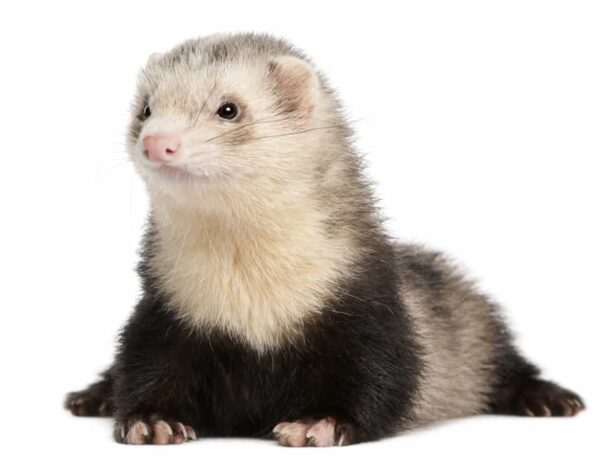Introduction
What Does A Ferret Eat: Ferrets, domesticated relatives of the European polecat, have been cherished as pets for centuries due to their captivating personalities and ability to form strong bonds with their human companions. To ensure their health and happiness, it is imperative to provide them with a diet that meets their specific nutritional requirements. Ferrets are obligate carnivores, which means their diet should primarily consist of meat-based sources of nutrition. In this exploration, we will not only unravel the intricacies of what a ferret should eat but also explore the various options available to cater to their dietary needs. From high-quality commercial ferrets swim foods to raw meat and special treats, we’ll dive into the diverse culinary world of these spirited pets, ultimately helping you provide the best possible sustenance for your furry friend.
As we embark on our journey to uncover the dietary preferences of ferrets, it’s essential to recognize that their nutritional needs are unique compared to many other common pets. Unlike dogs or cats, ferrets have a specialized digestive system that is designed for a diet high in animal proteins and fats. Their bodies are not equipped to efficiently digest carbohydrates, so their diet should be carefully crafted to reflect their natural carnivorous tendencies. In this exploration, we will delve deeper into the specific food items that form the core of a ferret’s diet. This will include a detailed look at high-quality ferret kibble, which is specially formulated to meet their nutritional requirements.
We’ll also explore the option of providing fresh meat and poultry as part of their diet, a practice some ferret owners prefer. Furthermore, we’ll touch upon the importance of fresh water and occasional treats to round out their diet. By the end of our journey, you’ll have a comprehensive understanding of what it takes to nourish a ferret properly and ensure their overall health and vitality. Raw meat can also be a part of a ferret’s diet, providing them with a natural and protein-rich food source. This can include raw chicken, beef, or organs like liver. However, it’s crucial to ensure that any raw meat offered to ferrets is fresh and of high quality to prevent the risk of bacterial contamination.

What do ferrets eat as a pet?
Ferrets are obligate carnivores, which means they must eat meat. Raw meat is the best option, including whole prey. Ferrets can also eat kitten food, as it has a high meat protein content, baby food that’s high in meat protein, and dried ferret food, that’s high in meat protein.
Ferrets, with their playful and mischievous personalities, make charming and endearing pets. However, to keep them happy and healthy, it’s essential to understand their dietary needs. Ferrets are obligate carnivores, which means their diet should primarily consist of animal-based proteins and fats.
Commercial ferret food is formulated to meet the specific nutritional requirements of these animals. Look for high-quality ferret kibble that lists meat as the primary ingredient. Avoid foods with excessive carbohydrates, as ferrets have difficulty digesting them.
In addition to commercial ferret food, fresh meat is an excellent dietary option for ferrets. Raw meat, such as chicken, beef, and organ meats like liver, can be offered in small portions. Some owners prefer to lightly cook the meat to reduce the risk of bacterial contamination. Offer a variety of meats to ensure a well-rounded diet. This helps prevent dietary boredom and ensures they receive a wide range of nutrients.
You can offer small, occasional treats to your ferret for training or as a special reward. Commercial ferret treats or tiny pieces of cooked egg or lean meat can be suitable choices. However, limit treats to prevent overindulgence.
What is the best food for a ferret?
“Meat protein that is easily digested is best for ferrets,” Dr. Fillman told The Dodo. “Vegetable protein is not advised for ferrets [due] to poor digestion. Grain should also be avoided in their diet because these pets are not able to digest fiber.”
Selecting the best food for your ferret is a critical decision to ensure their health and well-being. As obligate carnivores, ferrets require a diet high in animal-based proteins and fats while avoiding excessive carbohydrates.
High-quality commercial ferret kibble is a convenient and well-balanced option. Look for brands that list meat as the primary ingredient and contain a minimum of 30-40% protein and 15-20% fat. Ensure that the kibble does not contain excessive grains or fillers like corn, wheat, or soy, as these are not suitable for ferrets.
Fresh meat, such as chicken, turkey, beef, or organ meats like liver, can be an excellent addition to your ferret’s diet. Some owners prefer to lightly cook meat to reduce the risk of bacterial contamination. Offer a variety of meats to provide a broad spectrum of nutrients and prevent dietary boredom.
In most cases, a balanced commercial ferret food combined with fresh meat is sufficient to meet their nutritional needs. However, consult with a veterinarian experienced in ferret care to determine if any specific supplements are necessary.
What is a ferrets favorite meat?
Ferrets love both cooked and raw meat, in particular rabbit, poultry and mice. Raw meat should be given fresh and don’t worry about the bones, ferrets can eat bones and they are a great source of calcium, marrowbone and minerals.
Ferrets are natural carnivores, and their favorite meat is typically any high-quality, animal-based protein source. These playful and inquisitive creatures have a keen sense of smell and taste, which makes them particularly discerning when it comes to their meat preferences. While individual ferrets may have their own unique tastes, here are some types of meat that are generally well-received by these pint-sized carnivores.
Chicken is often a ferret’s top choice. Whether it’s boneless chicken breast, thigh meat, or even chicken hearts and liver, these are usually a hit with most ferrets. Chicken is lean and offers essential protein.
In the wild, ferrets would naturally hunt small game animals like rodents and birds. While it may not be practical to provide these live animals, you can mimic their natural diet with small pieces of raw or cooked game meat.
It’s important to remember that while these meats are generally well-received by ferrets, individual preferences can vary. Additionally, you should always ensure that any meat you offer is fresh, of high quality, and prepared in a safe manner to avoid contamination.
Are ferrets friendly pets?
Ferrets have an inquisitive and playful nature. They can learn to see humans as companions and form a strong bond with their owners. This makes them a popular pet choice because of their sociable and charming character.
Ferrets are endlessly curious creatures. Their insatiable desire to explore and investigate their surroundings makes them incredibly entertaining to watch and interact with. They are always on the lookout for new adventures and hidden treasures, keeping their human companions amused.
Ferrets have a strong capacity for forming deep bonds with their owners. They often seek out attention, cuddles, and playtime. Many ferrets enjoy being held, snuggled, and even curling up for a nap with their human friends.
Ferrets are highly social animals. In the wild, they live in groups, and this social nature extends to their interactions with humans. They thrive on companionship, both from other ferrets and their human caregivers. This sociability means that they can become lonely and anxious if left alone for extended periods, so it’s often recommended to keep them in pairs or provide ample human interaction.
Ferrets are known for their playful antics. They love games of hide-and-seek, chasing toys, and tunneling through blankets or tubes. Their boundless energy and mischievous behavior add excitement and laughter to any household.
Can ferrets eat pizza?
However, while most ferrets enjoy high-carbohydrate treats such as, raisins, fruit, yogurt drops, and pizza crusts, these foods should be avoided, as they contain excessive amounts of sugar which may especially be harmful to ferrets that have insulin-secreting pancreatic tumors.
Pizza typically contains ingredients that are not suitable for ferrets. The dough, for example, is usually made with flour and yeast, neither of which offers nutritional benefits to these carnivorous animals. The dough can also expand in the stomach, causing discomfort or even digestive issues.
Cheese is another common pizza topping, and while some ferrets may enjoy a small amount of dairy on occasion, many are lactose intolerant, which means they lack the enzyme needed to properly digest lactose. Feeding cheese or other dairy products can lead to gastrointestinal upset in ferrets.
Pizza often contains high levels of fat and sodium, both of which can be harmful to ferrets. These ingredients can contribute to obesity and other health issues, such as heart problems and high blood pressure.
Ferrets require a diet high in animal-based proteins and fats. Pizza, with its mix of carbohydrates and processed ingredients, does not provide the essential nutrients that ferrets need for optimal health.
Offering pizza to your ferret can lead to gastrointestinal issues, including diarrhea and vomiting, which can be uncomfortable and distressing for your pet.
Can ferrets eat baby food?
As ferrets are obligate carnivores, and do not digest vegetable fiber or tolerate high fructose sources like the fruit baby foods well, I strongly caution against them for use as dietary replacements. Baby food should be fed warmed to slightly above room temperature.
Baby food is primarily designed for human infants and contains ingredients that may not align with a ferret’s dietary requirements. Most baby foods consist of pureed fruits, vegetables, grains, and meats, which may not provide the ideal nutritional balance for ferrets.
Ferrets are obligate carnivores, meaning their diet should be primarily composed of animal-based proteins and fats. Baby food often lacks the high protein and fat content necessary to meet a ferret’s nutritional needs.
Many baby food products are high in carbohydrates, which are not suitable for ferrets. Ferrets have a limited ability to digest carbohydrates, and excessive carb intake can lead to health problems such as obesity and insulinoma.
Baby foods often contain additives, preservatives, and sweeteners that can be harmful to ferrets. These ingredients are not part of a ferret’s natural diet and may lead to digestive upset.
Do ferrets prefer hot or cold?
Ferrets. Ferrets are a species that prefers cooler temperatures and doesn’t tolerate the heat very well. If you need to keep your indoor space heated, consider keeping your ferrets in a cooler area. An indoor temperature of about 60 degrees Fahrenheit is ideal for healthy ferrets that have a thick winter coat.
Ferrets are better suited to cooler environments. They have a thick fur coat that helps insulate them against cold weather. In fact, ferrets are known to thrive in temperatures ranging from 50°F to 70°F (10°C to 21°C). This moderate range is typically comfortable for them, and they can remain active and playful.
Ferrets are more sensitive to heat than cold. They have a limited ability to regulate their body temperature, and excessive heat can be dangerous. Ferrets are at risk of heatstroke if exposed to temperatures above 80°F (27°C) for extended periods, especially if they are unable to find a cool and shaded place to escape the heat.
Ferrets naturally seek cooler spots when they become too warm. Providing access to a cool, shaded area, offering fresh water, and avoiding direct sunlight during hot weather are essential to keep them comfortable.
During the colder months, ferrets may require extra bedding or warmth in their sleeping area to ensure they stay cozy. Blankets or heated pads designed for pets can be used, but be cautious about overheating.
It’s important to note that individual ferrets may have their own temperature preferences. Some ferrets may be more tolerant of cold weather, while others may become uncomfortable in cooler conditions.
Do ferrets love humans?
Ferrets may be tiny, but they pack big personalities into small packages. These guys can be extremely loving and cuddly with their humans. Of course, it takes time to form that special friendship.
Ferrets, with their playful and curious personalities, have a remarkable capacity for forming strong bonds with humans. While they may not express their affection in the same way as dogs or cats, ferrets often exhibit clear signs of attachment and enjoyment in their interactions with their human companions. Let’s delve into the unique nature of ferret-human relationships and why these pint-sized pets can become truly beloved members of the family.
Ferrets are naturally social animals. They thrive on companionship and seek out interaction with their human caregivers. They often initiate playtime, inviting their owners to join in their antics.
Many ferrets enjoy physical contact and will happily curl up in their owner’s lap, nestle against their chest, or nuzzle their hands. These behaviors are often signs of affection and trust.
Ferrets may engage in grooming behaviors with their human companions, similar to how they groom each other in their natural social groups. Licking or nibbling your fingers gently is a sign of endearment.
Ferrets often recognize their owners and exhibit excitement when they return home or approach their enclosure. They may bounce and hop in greeting or even “dance” in response to familiar voices or scents.

Conclusion
Ferrets are obligate carnivores, which means their diet primarily consists of animal-based proteins and fats. Commercial ferret foods, designed to meet their unique nutritional requirements, offer a convenient and balanced option for pet owners. Additionally, fresh meat can complement their diet, but it should be of high quality and handled with care. A crucial aspect of ferret care is maintaining access to fresh water at all times, as proper hydration is vital for digestion and overall health. It’s essential to monitor their weight and condition to prevent obesity, a common issue in ferrets eat. While treats can be a delightful addition to their diet, they should be given in moderation to maintain the balance of their primary nutrition. Understanding and adhering to recommended feeding guidelines is paramount to ensure your ferret’s health and happiness.
In nurturing these playful and inquisitive creatures, a well-rounded diet is a cornerstone of responsible pet ownership. By providing them with the right foods and ensuring their dietary needs are met, you can ensure that your ferret thrives as a cherished member of your family. So, whether you opt for commercial ferret kibbles, fresh meat, or a combination of both, a balanced and nutritious diet is the key to a happy and healthy ferret companion. In addition to the practical aspects of feeding ferrets, it’s important to recognize that their diet is not just about sustenance; it’s also a way to bond with these spirited and affectionate creatures. Sharing mealtime moments, offering treats as rewards for good behavior, and observing their enthusiastic reactions to food can strengthen the human-ferret bond.
Furthermore, a well-rounded diet plays a significant role in preventing common health issues in ferrets, such as insulinoma, dental problems, and gastrointestinal disorders. Proper nutrition supports their immune system, maintains their energy levels, and contributes to a shiny, healthy coat. As responsible ferret owners, it’s our duty to stay informed about their dietary needs and adapt their food choices as they age or face specific health challenges. Consulting with a veterinarian experienced in ferret care is invaluable in addressing any dietary concerns and ensuring that your furry friend receives the best possible nutrition throughout their life.





No Comments